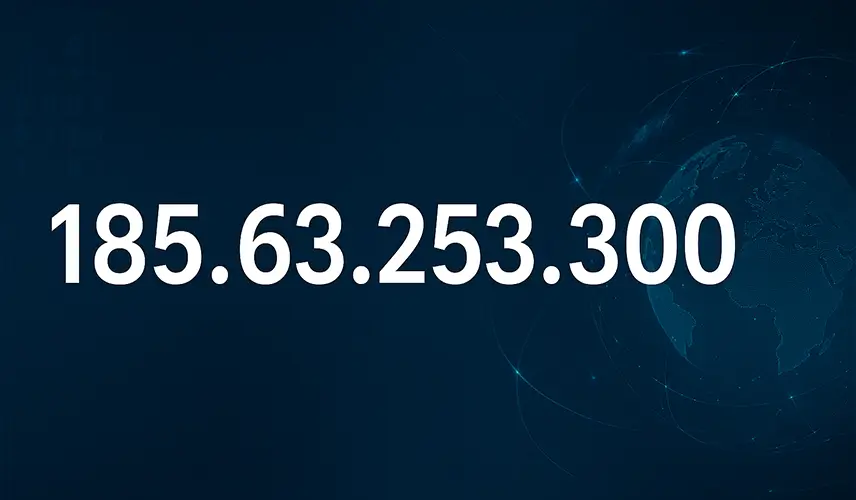185.63.263.20 may look like just another set of numbers on a screen, but it holds significance in the world of internet communication, network security, and digital forensics. This IP address can reveal where data comes from, who might be behind certain online activities, and even signal suspicious behavior in some cases. Understanding it requires knowing how IP addresses work, the role they play in modern networking, and how cybersecurity professionals investigate them.
What Is 185.63.263.20?
An IP address is a unique identifier assigned to devices connected to a network. In this case, 185.63.263.20 is an IPv4 address made up of four numerical segments separated by dots. It acts like a digital street address, allowing computers, servers, and other devices to send and receive data accurately. When an IP like this appears in server logs or cybersecurity reports, it may be linked to legitimate traffic, automated bots, or malicious activity depending on the context.
The Technical Side of IPv4 Addresses
IPv4 addresses are 32-bit numbers, traditionally written in dotted decimal format. They can be public or private. A public IP like 185.63.263.20 is accessible over the internet, while private IPs remain within local networks. The 185.x.x.x block is typically allocated to certain hosting providers or internet service companies. Network engineers and security analysts can trace ownership using WHOIS databases and other lookup tools to identify the organization responsible.
How 185.63.263.20 Appears in Cybersecurity Logs
Security analysts often come across IPs like 185.63.263.20 during routine monitoring. These appearances can indicate:
- A normal connection request from a web browser or API.
- Crawlers or indexing bots scanning web pages.
- Brute force or phishing attempts from malicious actors.
- Command-and-control (C2) traffic from compromised systems.
Common Uses of IP Addresses Like 185.63.263.20
An IP address in this range can be tied to various legitimate and illegitimate activities. Some examples include:
- Hosting Websites and Applications – Many data centers assign IPs like this to servers running public-facing apps.
- VPN and Proxy Services – Some privacy tools use such IP ranges to mask user identities.
- Automated Data Collection – Research bots and analytics tools can connect using these IPs.
- Potential Malicious Activity – Hackers may use IPs in certain ranges to launch cyberattacks.
How to Investigate 185.63.263.20
If you encounter this IP in your network or application logs, the first step is to perform an IP lookup. Useful methods include:
- WHOIS Lookup – Identifies the registered owner and contact details.
- Reverse DNS Lookup – Shows the domain name linked to the IP.
- Geolocation Tools – Pinpoint the general location of the server or user.
- Blacklist Checks – Determine if the IP is listed on spam or malware databases.
Security Risks Linked to 185.63.263.20
While many IP addresses in the 185 range are safe, some may appear in cybercrime investigations. Possible risks include:
- Distributed Denial-of-Service (DDoS) attacks.
- Spam email campaigns.
- Web application exploitation attempts.
- Credential stuffing attacks.
Organizations often block suspicious IPs or use firewall rules to restrict access when patterns of malicious activity emerge.
Protecting Your Network Against Unknown IPs
If you are a network administrator or website owner, handling unknown IP connections is crucial. Best practices include:
- Enabling a Web Application Firewall (WAF).
- Using intrusion detection and prevention systems (IDS/IPS).
- Setting up rate limiting to block excessive requests.
- Logging all access attempts for later review.
- Applying geofencing if the IP comes from an unexpected region.
These steps help reduce the risk of security breaches linked to IP addresses like 185.63.263.20.
Real-World Example: IP Analysis in Action
Consider a financial services company detecting repeated login failures from 185.63.263.20. Security analysts run WHOIS checks, find the IP is tied to a foreign hosting provider, and confirm it appears on multiple threat intelligence blacklists. The team blocks the IP at the firewall, notifies law enforcement, and strengthens login security. This swift action prevents potential account breaches.
FAQs
What is 185.63.263.20 used for?
It can be used for hosting, VPN services, or web crawling. In some cases, it may also be linked to cyberattacks.
Can I trace who owns 185.63.263.20?
Yes, by using a WHOIS lookup you can find the registered organization and technical contact.
Should I block 185.63.263.20?
If it shows suspicious activity in your logs, blocking it at the firewall or server level is recommended.
Is 185.63.263.20 dangerous?
Not inherently. The danger depends on the activity linked to it. Some IPs in this range are safe, while others may be malicious.
How do I check if 185.63.263.20 is blacklisted?
You can use online IP reputation tools to see if it appears on spam or malware blocklists.
Conclusion
185.63.263.20 is more than a random sequence of numbers it represents a unique endpoint on the internet that can be involved in legitimate traffic, security threats, or both. Knowing how to investigate and respond to such IP addresses strengthens your cybersecurity defenses. Whether you are an IT professional, a business owner, or just a curious internet user, being aware of how IP tracking works helps you stay secure online. If you find 185.63.263.20 in your network activity, analyze it carefully before taking action to ensure safety and avoid blocking legitimate services.

